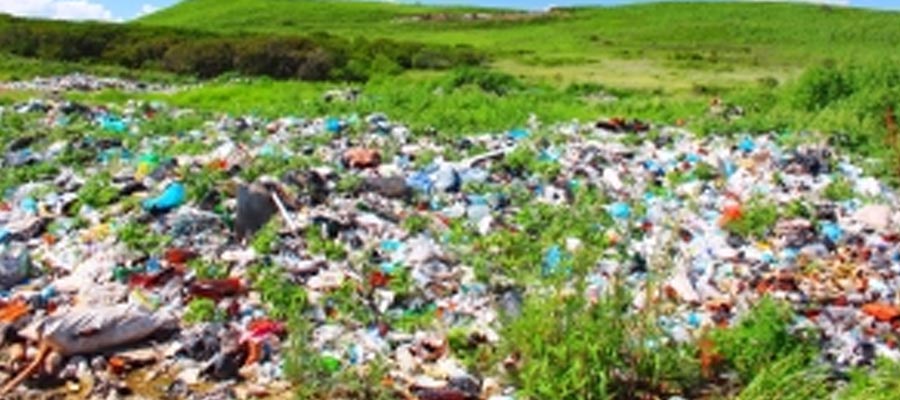The plastic bag has become the environment’s Public Enemy Number ONE.
You know what I’m talking about, those bags you get from the grocery store or the department store. They’re everywhere. You probably have a special place for them in your house – the pantry1 or under the sink2. Or maybe you just throw them in the trash bin?
Well that attitude is what’s made the plastic bag our environment’s biggest enemy. We don’t give a second thought to what we do with these bags because they are so common. So we throw them in the garbage or sometimes on the side of the road. Who cares, right?
As a result of that kind of thinking, these bags are everywhere.
They clutter landfills3. They flap from trees. They float in the breeze4. They clog5 roadside drains6. They drift on the high seas. They fill sea turtle bellies7.
Vincent Cobb, who runs http://Reusablebags.com, analyzed some data released by the United States Environmental Protection Agency in 2001 on U.S. plastic bag, sack, and wrap8 consumption. He found that somewhere between 500 billion and a trillion plastic bags are consumed worldwide each year. Of those, millions end up in the litter stream outside of landfills. Once they are in the environment, it takes months to hundreds of years for plastic bags to break down. As they decompose, tiny toxic bits seep9 into soils, lakes, rivers, and the oceans.
The main problem may not necessarily lie with the consumer, but with the store owner who hands out the plastic bags. On average, the economic advantage of plastic bags over paper bags has become too significant for store owners to ignore. It costs approximately one American cent for a standard plastic grocery sack, whereas a paper bag costs four cents for the store owner. Not only that, plastic bags are also cheaper to produce. They have captured at least 80 percent of the grocery and convenience store market since they were introduced a quarter century ago. When you look at a plastic bag as a product, it is an unbelievable success story.
But a lot of times there’s a flipside10 to success. Plastic bag litter has become such an environmental nuisance11 and eyesore12 that Ireland, Taiwan, South Africa, Australia, and Bangladesh heavily tax the totes13 or ban their use outright14. Several other regions, including England and some U.S. cities, are considering similar actions.
So what’s the alternative? Simple, reuse those plastic bags. Or find a bag or carton that you can use over and over again, something sturdy15 like cloth or any bio-degradable16 material. In Ireland everyone carries around a reusable bag when they go to the store. The plastic bags that once blighted17 the verdant18 Irish countryside are now merely an occasional eyesore. And this practice is catching on. Cities across the world are pushing this practice more and more.
But still the fact remains that we overuse them; and more importantly, take a moment and think about how little we actually need them.
It’s easy to make a difference pretty quickly. First, reduce. Ask the clerks at the stores you visit to keep their bags unless you really need one. Think about how often you walk out of a store with a book, a CD, or a carton of milk. Do you really need a bag? Bring cloth bags or a knapsack19 with you for your bigger trips.
For those plastic bags that do sneak20 their way into your home, hang on to them. Use them as garbage bags. Why pay for garbage bags when you’ve got a closet full of plastic bags already?
Most importantly, be conscious of the effect of a plastic bag culture. Next time you’re asked whether you want paper or plastic, pick a third option. Just about anything else is greener.
Prepared by Paul Houston
SLOVNIK 1 komora – spíž; 2 dres – dřez; 3 robiť neporiadok na skládkach odpadu – zaneřádit skládky odpadu; 4 lietať vo vánku – létat ve větru; 5 upchávať – ucpávat; 6odvodňovacia stoka, kanál – odvodňovací stoka; 7 brucho – břicho; 8 baliaca – balící; 9 presakovať, prenikať – prosakovat, pronikat; 10 pravý opak; 11 mrzutosť – mrzutost; 12škaredosť, hrozný pohľad – ohyzdnost, hrůzný pohled; 13 nositeľ – nositel; 14 úplne – úplně; 15masívny – masivní; 16 odbúrateľný – odbouratelný; 17 zruinovať – zruinovat; 18 /v∂:dnt/zelenajúcu sa – zelenající se; 19 /næpsæk/ batoh; 20prekĺznuť, vkradnúť sa – proklouznout, vkrást se
zdroj foto: shutterstock.com

